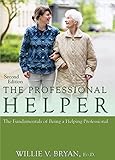The professional helper : the fundamentals of being a helping professional / by Willie V. Bryan, ED. D.
Material type: TextPublication details: Springfield, Ill. : Charles C Thomas, Publisher, Limited, (c)2015.Edition: Second editionDescription: 1 online resourceContent type:
TextPublication details: Springfield, Ill. : Charles C Thomas, Publisher, Limited, (c)2015.Edition: Second editionDescription: 1 online resourceContent type: - text
- computer
- online resource
- 9780398090852
- BF636 .P764 2015
- COPYRIGHT NOT covered - Click this link to request copyright permission: https://lib.ciu.edu/copyright-request-form
| Item type | Current library | Collection | Call number | URL | Status | Date due | Barcode | |
|---|---|---|---|---|---|---|---|---|
 Online Book (LOGIN USING YOUR MY CIU LOGIN AND PASSWORD)
Online Book (LOGIN USING YOUR MY CIU LOGIN AND PASSWORD)
|
G. Allen Fleece Library ONLINE | Non-fiction | BF636.6 (Browse shelf(Opens below)) | Link to resource | Available | ocn915775007 |
Revised edition of the author's The professional helper, 2009.
Includes bibliographies and index.
Preface -- The professional helper -- The helping relationship -- Understanding self -- Understanding human behavior -- Understanding cultural differences -- Understanding disabilities -- Understanding religions -- Understanding resources -- Helping professional's roles in cultural evolution -- Future challenges for helpers -- Analysis of a professional helping relationship -- Understanding individual counseling -- Understanding family counseling -- Conclusion -- Name index -- Subject index.
COPYRIGHT NOT covered - Click this link to request copyright permission:
https://lib.ciu.edu/copyright-request-form
The professional helper should be a teacher, a mentor, a motivator and a guide when assisting helpees find solutions to their life situations. Most clients have within themselves the answers to most if not all of their life situations; quite often, what they need is someone to assist them in sifting through and evaluating the various possible responses for a situation. This revised and expanded new edition continues the theme of the first edition in providing a basic understanding of the various kinds of helping relationships and characteristics that an effective helper must possess. An overview of the major issues the United States has encountered, and to some degree successfully overcome with the involvement of the helping professional, is presented. Part I covers personal skills that a helper should possess such as understanding self, understanding human behavior, cultural differences, disabilities, religion, and resources. Part II discusses the impacts of the changing roles of helping professionals, roles in cultural evolution, and future challenges for helpers. Part III provides an analysis of theoretical views for helping relationships. A discussion of the theories are provided to enable helpers develop their own professional approaches to helping clients. Other topics include understanding individual and family counseling, preparing the helper to provide the best professional and ethical services possible, a sound understanding of human behavior, how to conduct the helping relationship from the standpoint of process, establishment of goals, and the implementation of these goals.
There are no comments on this title.
